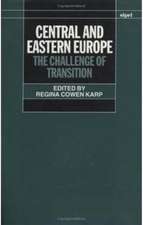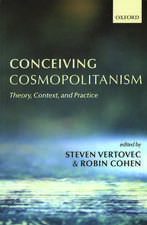Haiti in the Balance: Why Foreign Aid Has Failed and What We Can Do About It
Autor Terry F. Buss Cu Adam Gardneren Limba Engleză Paperback – 19 aug 2008
Even after years of receiving considerable foreign aid, Haiti remains an impoverished, tremendously fragile state. Over a span of ten years, the United States spent over $4 billion in aid to Haiti, yet the average Haitian still has to survive on one dollar a day. Why has assistance been so ineffectual, and what can we learn from Haiti's plight about foreign aid in general? Haiti in the Balance tackles those questions by analyzing nearly twenty years of Haitian history, politics, and foreign relations. Terry Buss and his colleagues at the National Academy on Public Administration found a general failure to reinforce the capacity of institutions at all levels of Haitian government. Building up that system of institutions appears to be a necessary precursor to a nation using foreign aid in the most effective manner. Such an effort demands improved security, a more professional (and less corrupt) bureaucracy, and eventually decentralization and perhaps even some privatization. Different levels of government must be willing to learn how best to work with one another: according to Buss, "Haitian governments seemed consumed by politics, rather than good governance." People still matter, and so does administration. Until we learn that lesson, even the most generous foreign aid will not fulfill its intent.
Preț: 275.40 lei
Nou
Puncte Express: 413
Preț estimativ în valută:
52.70€ • 55.16$ • 43.86£
52.70€ • 55.16$ • 43.86£
Carte tipărită la comandă
Livrare economică 31 martie-14 aprilie
Preluare comenzi: 021 569.72.76
Specificații
ISBN-13: 9780815713913
ISBN-10: 0815713916
Pagini: 230
Dimensiuni: 152 x 229 x 17 mm
Greutate: 0.4 kg
Editura: Brookings Institution Press
Colecția Brookings Institution Press
ISBN-10: 0815713916
Pagini: 230
Dimensiuni: 152 x 229 x 17 mm
Greutate: 0.4 kg
Editura: Brookings Institution Press
Colecția Brookings Institution Press
Notă biografică
Terry F. Buss is the director on international programs at the National Academy of Public Administration. He has published 12 books on a number of policy issues, most recently Modernizing Democracy: Innovations in Public Participation, written with F. Steven Redburn and Kristina Guo (M.E. Sharpe, 2006). Adam Gardner is currently a graduate student of public administration at the University of Southern California.
Descriere
A Brookings Institution Press and the National Academy of Public Administration publication
Even after years of receiving considerable foreign aid, Haiti remains an impoverished, tremendously fragile state. Over a span of ten years, the United States spent over $4 billion in aid to Haiti, yet the average Haitian still has to survive on one dollar a day. Why has assistance been so ineffectual, and what can we learn from Haiti's plight about foreign aid in general? Haiti in the Balance tackles those questions by analyzing nearly twenty years of Haitian history, politics, and foreign relations.
Terry Buss and his colleagues at the National Academy on Public Administration found a general failure to reinforce the capacity of institutions at all levels of Haitian government. Building up that system of institutions appears to be a necessary precursor to a nation using foreign aid in the most effective manner. Such an effort demands improved security, a more professional (and less corrupt) bureaucracy, and eventually decentralization and perhaps even some privatization.
Different levels of government must be willing to learn how best to work with one another: according to Buss, "Haitian governments seemed consumed by politics, rather than good governance." People still matter, and so does administration. Until we learn that lesson, even the most generous foreign aid will not fulfill its intent.
Even after years of receiving considerable foreign aid, Haiti remains an impoverished, tremendously fragile state. Over a span of ten years, the United States spent over $4 billion in aid to Haiti, yet the average Haitian still has to survive on one dollar a day. Why has assistance been so ineffectual, and what can we learn from Haiti's plight about foreign aid in general? Haiti in the Balance tackles those questions by analyzing nearly twenty years of Haitian history, politics, and foreign relations.
Terry Buss and his colleagues at the National Academy on Public Administration found a general failure to reinforce the capacity of institutions at all levels of Haitian government. Building up that system of institutions appears to be a necessary precursor to a nation using foreign aid in the most effective manner. Such an effort demands improved security, a more professional (and less corrupt) bureaucracy, and eventually decentralization and perhaps even some privatization.
Different levels of government must be willing to learn how best to work with one another: according to Buss, "Haitian governments seemed consumed by politics, rather than good governance." People still matter, and so does administration. Until we learn that lesson, even the most generous foreign aid will not fulfill its intent.

















